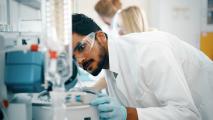
Biotech
Human history has been all but defined by death and disease, plague and pandemic. Advancements in 20th century medicine changed all of that. Now advancements in 21st century medicine promise to go even further. Could we bring about an end to disease? Reverse aging? Give hearing to the deaf and sight to the blind? The answer may be yes. And soon.
More
Can cognitive behavioral therapy break the cycle of violence?
CBT is a promising way to reduce violence, so why has it been so hard to scale?
Civilian oversight is a solution to police misconduct. But is it effective?
Creating a civilian review board to oversee police conduct seems like a straightforward solution to disciplinary…
Do we need more police or better police?
American cities are safer than they used to be, but they’re still quite violent, and many economists think they’re…
This fearless principal used UFC & skateboards to save a failing school
How one relentless, unconventional principal rallied an underdog school.
Why drugs are hurting more people than ever – and what to do about it
Is the solution to dangerous drugs… making them safer?
Science funding is wasting young careers. Here's how to fix it.
Basic science funding is a mess. Fixing it could radically improve the pace of innovation.
How a smartphone can detect a deadly disease, without a lab, for free
This app tests for anemia, and it’s nearly as good as the gold-standard lab test.
Hacking the brain's comms network – without surgery
When nerve cells in the brain communicate, they create tiny electric fields that can be sensed – and sometimes…
An app to help prevent suicide
Meet the teens who built the notOK App: a “panic button” for people who need help.
A tumor-killing virus could treat eye cancer and save children's sight
The only treatment for retinoblastoma is surgical removal of the eye—but scientists may have found another way:…
The plan to wipe out mosquitoes using genetic engineering
The world’s richest and poorest people are teaming up against humanity’s deadliest predator.
Training the body to fight off drug-resistant bacteria
A new strategy, called host-targeted defense, could help solve antibiotic resistance by upgrading the immune system.
Why cancer patients should get genetic sequencing
Genomic sequencing saved his live. Now he wants everyone to have access.
Finding a new drug in one-third the time and one-thousandth the cost
How a pediatric cancer drug went from discovery to clinical trials in five years and just $500,000.
Living drugs may be the key to beating genetic disease
Engineering bacteria in the microbiome could fix previously untreatable genetic disorders.
Making tumors glow to improve cancer surgery
This surgeon is improving surgery by lighting up cancer cells.
What is cystic fibrosis—and what is it like?
What you need to know about this genetic disease, explained by someone who knows it inside and out.
How redesigning labs can demystify genetic science
“Scientists work in high-security buildings that are banned to the public and then wonder why they are misunderstood.”
Subscribe to the newsletter































